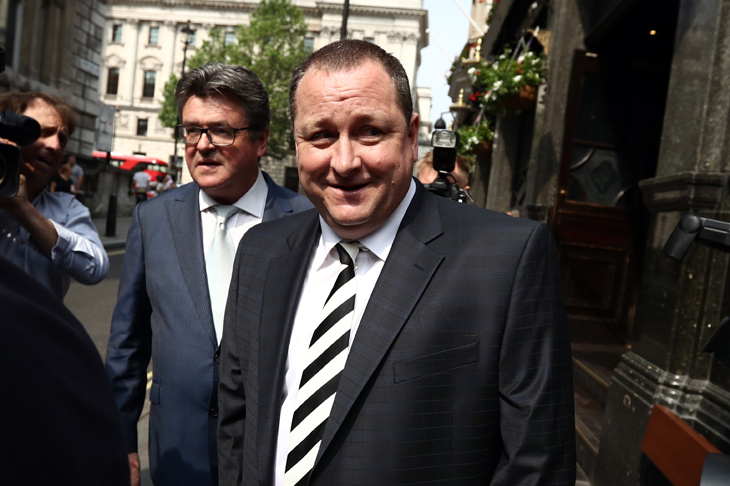This column has consistently stood up for Mike Ashley, even when the lonesome billionaire’s notions of corporate governance at Sports Direct and staff welfare at its Shirebrook warehouse made that a challenging position to sustain — not to mention his troubled ownership of Newcastle United. Ashley has grown his core business over 35 years from one outlet in Maidenhead to a remarkably robust retail empire by doing the detail, taking shrewd bets and swallowing competitors. Reportedly genial in private, he has always been uncomfortable in public and has had to contend with a peculiar form of British snobbery, which is that we expect our self-made tycoons to evolve into toffs (like the late British Airways chairman Lord King, a former car salesman turned master of foxhounds) rather than, as Ashley seems to prefer, continuing to project the image of a sweaty football fan out for a rumble.
Some years ago I suggested he start the process of shifting upmarket by bidding for Harrods — but perhaps wisely he avoided tangling with its Qatari owners. Instead he has stepped in with a knockdown £90 million rescue bid for the failing 59-store House of Fraser chain, with the intention of making it ‘the Harrods of the high street’ and saving as many as possible of its 17,000 jobs. In the current collapse of bricks-and-mortar retailing, some say that’s a crazy aspiration. The army of Ashley haters (a coalition of Labour MPs, Newcastle fans and the City establishment) will dance with glee if it all goes the way of BHS. But if anyone can offer shoppers a lively new experience in House of Fraser’s beached-whale town-centre stores it is Mike Ashley. I hope his reward is a peerage: Lord Shirebrook has a ring to it.
Black swan?
The award by a Californian court of $289 million in damages to Dewayne Johnson, a groundsman who claimed the weedkiller Roundup caused his cancer, has the makings of what investment pessimists call a ‘black swan’: an unforeseen event with extreme consequences. Roundup is made by Monsanto, the US company that leads the world in genetic modification of seeds and is regarded by the green movement as Satan. Monsanto was recently acquired by the German pharma giant Bayer for $66 billion; Bayer’s shares plunged on news of the Californian award and — with thousands of similar claims pending — could fall a lot further if the jury’s decision is not overturned.
But this story is not just about Bayer and whether it did sufficient due diligence before buying Monsanto. Roundup is used on a massive scale in global agriculture, in combination with Monsanto’s Roundup Ready arable crop seeds, which are modified to resist the weedkiller while the weeds around them die. Traces of the Roundup chemical glyphosate have thereby found their way into human foodstuffs such as biscuits and breakfast cereals, but Monsanto (backed by laboratory studies) has thus far been able to claim it is less dangerous than table salt or caffeine. If the Californian case leads governments to conclude otherwise and ban Roundup, crop yields could plummet and staple food prices could soar. At this juncture it looks highly unlikely — but that’s what black swans are all about.
Unintelligent treatment
Britain’s oldest bank, C. Hoare & Co of Fleet Street, is generally regarded by its 15,000 customers as a refuge from the modern world of pushy, dehumanised and too-often mis-sold financial services. But having spent 346 years avoiding the media, the Hoare family’s belief in the merit of a low profile must have been reconfirmed by sniping coverage of their announcement in May that Henry Hoare, Sir David Hoare and Richard ‘Tigger’ Hoare, with 182 years’ service between them, were retiring from the partnership, and 32-year-old investment specialist Rennie Hoare was joining. The FT took the opportunity to call Hoare’s ‘staid’ and ‘idiosyncratic’ and the changeover a ‘long-awaited shake-up’ as the bank ‘grapples with increased competition from digital challengers offering cheaper, faster services’. Now I see senior partner Alexander Hoare has hit back in a letter to customers highlighting the strength of the bank’s balance sheet and quoting the ancient Chinese philosopher Lao Tzu: ‘Respond intelligently even to unintelligent treatment.’
House to house
In ‘Aubade’, Philip Larkin’s poem about fear of death, ‘postmen like doctors go from house to house’. In the parts of rural France that have been colonised by the British, this summer’s door-to-door caller is the local estate agent, summoned to offer an opinion on the possibility of a quick sale before the final Brexit debacle. His answer is always the same. There’s a flicker of life at the bottom end of the market, but if you were tempted into buying a manoir when the pound was strong and the cost of French living felt refreshingly cheap, you’re stuffed. In the Dordogne, a sensible asking price is about half what you think your house is worth and you could wait years for a buyer even at that.
Better to sit tight until next summer or beyond — says the doleful agent, dashing for his next appointment. Meanwhile, as the cost of eating as well as living creeps up faster than in the UK, I’m on my annual August mission to spotlight value-for-money restaurants. Last year I gave L’Esplanade at Domme a bad rap because it refused me a morning coffee; this year, it redeemed itself with a memorable dinner at a table with a breathtaking westward view across the Dordogne valley. Hard not to think about endings as we stared into the blazing sunset, but the €30 three-course menu made us feel a lot better.
Huge thanks to the many readers who sent me their broadband experiences; the mailbox is now closed. I’ll attempt a synopsis shortly and our dossier will be on its way to BT’s chairman by the end of the month.







Comments